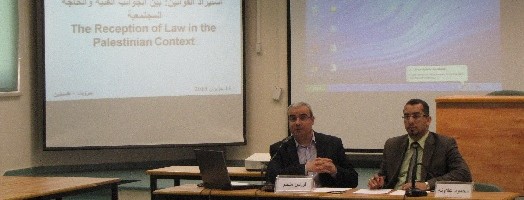The Reception of Law in the Palestinian Context
Supported by Konrad Adenauer Stiftung - Palestinian Territories, the legal encounter was presented by Dr. Feras Milhem, Expert in Constitutional Law. In addition to IoL Director Dr. Ghassan Faramand, the event brought together a select number of members of the legal community, representatives of government bodies and civil society groups, participants in the Professional Diploma Programme in Legislative Drafting, legal researchers, and law students.
In his opening statement, Mr. Mahmoud Alawneh, Manager of the IoL Legislative Support Department (LSD), welcomed the speaker and audience. Reception of laws is of particular importance to participants in the IoL-sponsored Professional Diploma Programme in Legislative Drafting, which targets government legal staff. The Palestinian legislative system has been impeded by several challenges caused by reception of laws. Mr. Alawneh explained that the law making process should go through several stages, starting with development of a legislative policy, regulatory assessment of social, legal and financial impacts, and ending with consolidation of legislative drafting techniques. Inquiring about how feasible reception of laws was, Mr. Alawneh also raised informed questions about positive and negative aspects of the process.
Dr. Milhem commended the significant role the IoL plays in legislative support and drafting in Palestine. Providing an overview of relevant legal opinions, Dr. Milhem reviewed works of key scholars who provided valuable input into reception of laws, including Alan Watson and Kane Front. A variety of concepts and terms are used to express reception of law, including importation of laws and enforcement of laws. Laws are enforced by a colonial power, which enforces colonial laws on colonial peoples. Through technical support programmes delivered to other countries, donor policies also impose particular legislative policies.
Dr. Milhem made a presentation of the process of, and challenges to, the reception of law process, highlighting Turkey’s experience in enactment of the Civil Law. According to Dr. Milhem, legal reform is managed by a self-codification process within the state. Otherwise, reception of law must be aligned with the domestic legal system of the state.
The Palestinian legislature has relied on an extensive reception of law process. Early in the Palestinian legislative process (before the internal Palestinian political divide took place), good laws used to be passed by the Palestinian Legislative Council (PLC). In spite of certain challenges, an integrated legislative process was in place, including proposition, approval and promulgation of legislative acts. Then, Palestinian civil society organisations played an active in the legislative process. In a second legislative phase (after the internal split), the legislative process in the West Bank was controlled by a single authority. In the Gaza Strip, legislative activity was dominated by an ideology of the Gaza-based legislature’s conception.
In conclusion, Dr. Milhem emphasised that reception of law was a key legal reform procedure. It can be a good and healthy legislative and social process. Starting with legislative policy preparation, received laws will be rightly aligned with the domestic legislative framework. Reform will be informed by a sound, accurate legislative process, where the law-making process goes through all prescribed phases.
In the ensuing discussion, the audience raised questions and made informed interventions. Advisor Fawwaz Abu Zir highlighted a real challenge to reception of laws, particularly translated ones. Dr. Ghassan Faramand asserted that reception of law has turned into a globalisation of legislation, posing significant challenges to the national legislature and law-maker. Domestic legislation needs to be compatible with the international conventions Palestine has recently acceded to. Of these, Palestine has ratified many conventions with reservation. Other discussants addressed challenges to the law-making process, particularly with regard to public consultations.











